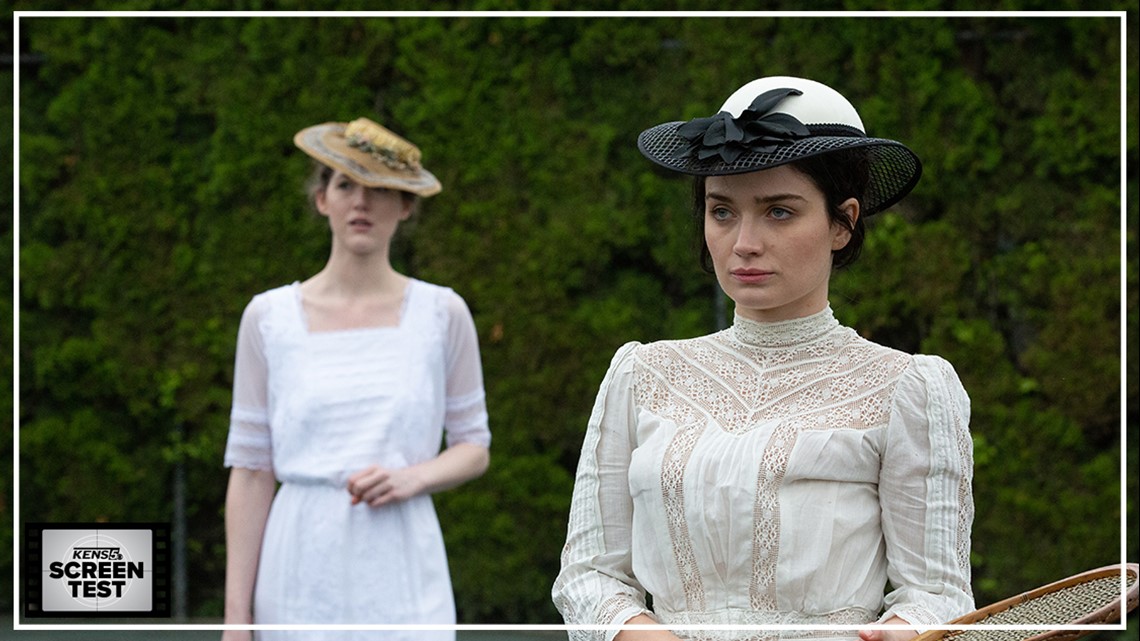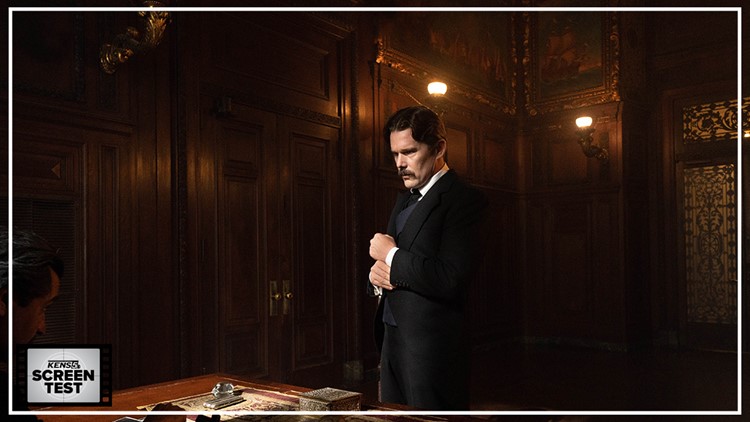An enigma of a historical biopic eager to burst out of expected genre clichés just when it seems to be wrapping itself up in them, the point of “Tesla” doesn’t seem to be education so much as enlightenment. Oh sure, all the traditional boxes are checked as the air is cleared about one of history’s most important (and, the movie argues, overlooked) scientific minds; the production design seems accurate to the period, the facts seem well-researched, Ethan Hawke’s titular performance seems like appropriate imitation. What you expect to find when you hear the words “historical biopic,” you will mostly get—with all the murkiness of fact and fiction that comes with it.
Until, that is, murkiness becomes the movie’s purpose. What sets writer-director Michael Almereyda’s biopic apart (mostly as strength, occasionally as misstep) is an awareness of the subjective path on which we approach these kinds of historically informed movies; an awareness that he boldly recalibrates into a strange stream-of-consciousness sensibility that is as disorienting as it is alluring. Having worked on his screenplay since the ‘80s, Almereyda is asking us to meet him halfway, to absorb the anecdotes of Nikola Tesla’s journey and also to acknowledge the unspoken quandary of any biopic: When everything can be dramatized, what role does truth really have to play? In considering the question, Almereyda finds a novel approach to the deconstruction of a real-life figure’s myth that hasn’t been this entrancing since Danny Boyle’s “Steve Jobs” odyssey.
There’s the expected talk of voltage potential, alternate currents and distribution of energy in “Tesla,” but the screenplay’s most astute fascination – also the element that tinges this story with tragedy – is the tug-of-war between scientific potential and financial limits that kept Nikola Tesla a destitute man for much of his life, constantly seeking investment for his research (research that would hasten the arrival of the radio and wireless capability).
As a kind of historically informed and tortured Dr. Strange, the ever-capable Hawke relays dialogue that is, more often than not, an obtuse mixture of scripture and philosophy. But it’s in the resigned key through which he brings the character to life that lends the movie a template of grandiosity and legacy for Almereyda to build on.
I sometimes wondered if Nikola Tesla might be just a bit too obscure a subject for Almereyda’s approach to fully pay off; thankfully, that obscurity is part of the charm. If “Steve Jobs” contended with our expectations of a genius whose impact is apparent on the device you might be reading these words from right now, “Tesla” shapes the fact that its central figure has only recently begun to attain his rightful place in history into an advantage.
While chronology was crystal-clear in Boyle’s techno-dreams drama about Apple Inc.’s icon, there’s no place for it in Almereyda’s story—no coherent place anyway. And in eschewing the ostensible requirement of providing clear places and times for every scene, “Tesla” is free to recreate pivotal meetings, discoveries and shortcomings involving its subject with an off-the-cuff energy that manages to feel truer to Tesla’s spirit than the straightforward History Channel special.
It allows the work to double back on itself, too. (Or, if you like, it allows the film to ride an alternating current, expanding its potential.) An early scene finds Hawke stumbling around a courtyard, as if in a drunken stupor. It isn’t until revisiting the moment later on that we see he wasn’t struggling to stay on his own two feet, but rather on rollerskates in a fairly confined space. It’s a fun little twist/reveal of little relevant consequence, but it’s also exemplifies Almereyda’s thesis, one that goes beyond Nikola Tesla himself: History is only as concrete as the perspective we’re viewing it from.
Almereyda breaks the ice early on his beguiling storytelling strategy, going as far as to halt the proceedings so that an omniscient guide of sorts, played by Eve Hewson (later revealed to be Anne Morgan, the daughter of J.P. Morgan with whom Tesla will become involved), can address us directly for some record-straightening in regards to what we’re seeing on the screen—events ranging from Thomas Edison (here portrayed by Kyle MacLachlan, relishing the role) refusing to support Tesla’s ideas to his relationships with Morgan and the actress Sarah Bernhardt to a relocation to Colorado, where frequent lightning storms would spark newer innovations.


If you’re anxious that these sojourns give the movie a splintered feel, there’s no reason to worry; “Tesla,” for the most part, remains delightfully dexterous in its inexplicable balance of history lesson and imaginative presentation. The strangeness is natural to the milieu. The tone is too earnest to call the filmmaking flamboyant, but also playful enough to call it overly sincere (this is very much a good thing). “Tesla” only solidifies its unorthodox approach as it transposes a moving, breathing Hawke into environments of still photographs before having him step up to the mic for one of the most bizarre karaoke performances the movies have seen in some time.
Bizarre, that is, until we remember Almereyda’s nothing-is-off-the-table motivations, a vision taken to heart by Carl Sprague’s illusionary production design and Kathryn Schubert’s electric (ha) editing. As is the case with more conventional biopics that we suspect would work better as straightforward documentary (and, let’s face it, most of them would), how enticed the viewer is by history isn’t the ultimate barometer of how deeply they will engage with “Tesla.”
The movie practically hints at such when Anne says to Nikola “you live in your head.” He responds with cheeky innocence: “Doesn’t everyone?” If being in Tesla’s head for 100 minutes feels just a little maddening, that may very well be evidence of the duality Almereyda presents in the movie’s truth: We can retroactively appreciate what the inventor has done, even if we can never fully decipher how wide his mind had to stretch for him to have done it.
"Tesla" is rated PG-13 for some thematic material and nude images. It's out now in some theaters, and is also available to rent on VOD platforms.
Starring: Ethan Hawke, Eve Hewson, Josh Hamilton, Kyle MacLachlan
Directed by Michael Almereyda
2020
OTHER SCREEN TEST REVIEWS
- ‘Unhinged’ Review: Russell Crowe is on a rampage in brutal, thematically stagnant thriller
- ‘Boys State’ Review: Political maneuvering knows no (age) limits in enthralling new documentary
- ‘Sputnik’ Review: Spunky and smart creature feature makes for a tantalizing feature debut
- SA Film Fest Review: Straightforward doc ‘My Father’s Brothers’ gives short shrift to a harrowing Vietnam War story
- 'Canción Sin Nombre' Review: Haunting drama zeroes in on the no man's land of political revolution
- ‘She Dies Tomorrow’ Review: An unnerving study of primal reckoning
- 'Radioactive' Review: An actively frustrating biopic



